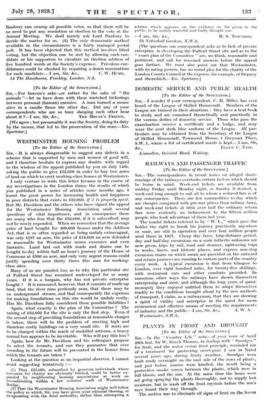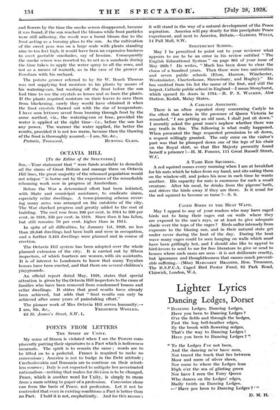PLANTS IN FROST AND DROUGHT [To the Editor of the
SPECTATOR.] SIR,—In the " Country Life " notes of your issue of April 28th last, Sir W. Beach Thomas, in dealing with " Smudges " for fruit, and the water versus frost principle, reminded me of a treatment for protecting sweet-peas I saw in Natal several years ago, during frosty weather. Smudges were built ready overnight on the east side of the rows of plants, and just before sunrise were kindled, the result being a protective smoke screen between the plants, which were in full bloom, and the sun. At the same time the hoses were set going spraying the plants thoroughly, not to supply lost moisture, but to wash off the frost crystals before the sun's rays found their way _through.
The motive was to eliminate all signs of frost on the.lcaves and flowers by the time the smoke screen disappeared, because it was found, if the sun reached the blooms while frost particles were still adhering, the result was a burnt bloom due to the frost acting as a burning glass to the sun. As the cultivation of the sweet peas was on a large scale with plants standing nine to ten feet high, it would have been an expensive business to erect portable sunshades, say of hessian. Consequently the smoke screen was resorted to, to act as a sunshade during the time taken to apply the water spray to all the rows, and not as a means of warmth, as in the ease of the grower at Evesham with his orchard.
The potato grower referred to by Sir W. Beach Thomas was not supplying lost moisture to his plants by means of his watering-can, but washing off the frost before .the sun had time to use the crystals as lenses and so burn the plants. If the plants required moisture on their leaves to save them from blackening, surely they would have obtained it when the frost crystals thawed out with the rise of temperature. I have seen lettuces saved from burning through frost by the same method, viz., the watering-can or hose, provided the water is applied at the right time--i.e., before the sun has any power. The warmer the water applied, the better the results, provided it is not too warm, because then the thawing of the frost is thoroughly assured.—I am, Sir, &c.,





































 Previous page
Previous page